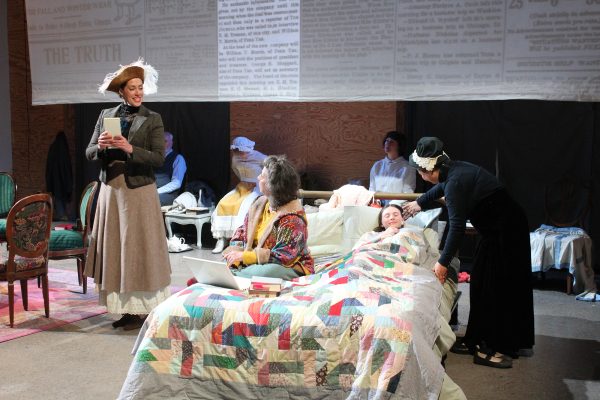
Courtesy of Claire Mannle/Used by permission of the Cherry Arts."
The Cherry Arts produces Saviana Stanescu's play 'Ithaca Fever,' later to be awarded NEA grant funding for its world premiere. Since the grant's termination, The Cherry Arts has been asking for donations to cover the costs of the project.
In November 2024, The Cherry Arts — a local arts hub in Ithaca whose art spaces host multidisciplinary arts and performances — received an official award letter from the National Endowment of the Arts in support of the world premiere of their play “Ithaca Fever.” This May, Sam Buggeln, the artistic and executive director of The Cherry Arts, was notified that the NEA was canceling the previously promised grant.
The Cherry Arts was awarded a total of $15,000 from the NEA in their official award letter. Because the NEA works on a reimbursement model, the money has already been spent. With the time and labor already spent on the project, The Cherry Arts is now asking their supporters to help fundraise.
Buggeln said that when the company sent the NEA copies of their financial receipts for reimbursement, they were instead greeted with an email of grant termination. As soon as he found out he said he began writing the email the company would eventually send to its supporters.
“We’re not really a big company, $15,000 is not enough money to make a company go bankrupt, but it’s also a real debt,” Buggeln said. “I actually was typing so furiously and revising that I overheated the phone more than once in the airport line and had to put it away in my pocket and breathe deeply.”
Buggeln said the award letter stated the period of the award to be Jan. 1 to June 30, 2025. He said that their project had been officially completed by April 20 and that it was shocking to have grants withdrawn for projects that had already been completed. Buggeln said that they have made a dent in the financial loss, however, they are not close to filling in the gap.
Civic Ensemble, a public theater in Ithaca, received the same email of grant cancellation for their project partnered with Cayuga Addiction Recovery Services Residential Addiction Recovery Center. Julia Taylor, executive director of Civic Ensemble, said that the project is in support of their re-entry theater program where survivors of incarceration create their own theater about the issues that matter to them and as a community.
“The arts is on the chopping block on a national level,” Taylor said. “When I received this email, I felt angry and not completely surprised.”

On May 2, before the NEA sent these emails, President Donald Trump listed the NEA under “small agency eliminations,” proposing to cut the NEA out completely in his budget plan for the next fiscal year. According to the budget document, the proposal was consistent with his efforts, including reducing “unnecessary governmental entities.”
Saviana Stanescu, the playwright of “Ithaca Fever,” said that the show had been sold out for most performances when it first debuted at The Cherry Arts. The play is based on a combination of Ithaca’s history with a fatal typhoid epidemic in 1903 and partly on Stanescu’s experiences as a newcomer in town and COVID-19. Buggeln said that the play handled questions of how the media should ethically cover an epidemic of 1903 and compliance with protective measures.
This is the second year that Civic Ensemble has been awarded an NEA grant for their ReEntry Theater Program.
“They’re very competitive grants and I think that in some ways it’s a badge of honor,” Taylor said. “It has felt like a huge, significant accomplishment for Civic Ensemble over these last two years and a deep recognition of the importance of the work that we’re doing in our community, and the importance of the voices of people who have been historically marginalized in creating their [own] theater.”
In January the NEA announced 1,474 awards for this award period, totalling $36,790,500 for projects across all 50 states as well as Puerto Rico and Washington DC.
“I feel bad and regretful for the up and coming artists in whatever discipline who, if there’s no NEA, or if the NEA doesn’t grant at all for two, four [or] six years [won’t get] that kind of nice feeling of a national panel of artists has looked at your work and decided that they think it’s great and want to reward it,” Buggeln said. “That’s a great feeling. And I’m sorry that, even the money aside, that that might not be available to people in the coming years because it was so meaningful to us.”
Sydney Pinhack ’24 put on her original play “Calling Bluffs” at The Cherry Arts after graduation. She said that as a young person going into the field, it is scary for her to see that not only is it difficult to secure funding for theater projects, but that it is not guaranteed that the funding will stay.
“Grants and donations are sometimes the only way to keep a theater running,” Pinhack said. “I made a certain chunk of money off of my show’s ticket sales, but we made the bulk of that show’s profit through donations and also just certain things you have to pay before the show opens.”
The Cherry Arts and Civic Ensemble are continuing to raise money for their respective projects. Taylor and Buggeln both said they have received love and support from the community to help close their financial gaps.
“There’s just been a really wonderful outpouring of support because I think people recognize the injustice of it,” Buggeln said. “There’s nothing that we could have done to anticipate this and it’s just put us in a really bad situation when the arts are [already], at the best of times, in a battle situation.”
Taylor said she thinks this is a moment where the arts community, locally and nationally, is taking a bold step towards communicating the importance of art and federal arts funding.
“I feel very pessimistic about what the future of national arts funding will be, but I also feel very moved and inspired by the very deep organizing that the art community is doing,” Taylor said. “I think it’s critically important that we all continue to advocate for the arts … we can’t let this be one of those moments where the arts become an easy thing to cut at the bottom of a budget.”
Senior Sylvia Grosvold, who was an actress in “Calling Bluffs,” said that some of the most wonderful theater starts from an experimental place, which is not something that could be done without funding.
“If you are so worried about recouping money and being able to fund the next season of shows, theater companies aren’t going to want to take risks on new work, on new artists, on new playwrights, new actors, new directors [or] new styles of theater and theater can get very limited,” Grosvold said.

Stanescu said that the production was demanding for a small theater such as The Cherry Arts. It involved paying 9 actors, having period costumes and sets and projections of articles from 1903, all of which needed funding.
“I grew up in Romania during [Nicolae] Ceaușescu’s dictatorship,” Stanescu said via email. “I learned at an early age what struggles and hardships are. However, I also learned that artists will always find ways to tell their stories despite or even because of hardships.”
Taylor said that historically the arts are underfunded and undervalued. She said that the time, labor and resources require funding, and that having a federal arts agency valuing that time and work that is critical to setting a positive outlook on the arts for the rest of the nation.
“[We are] looking to both our funders and our community to continue to be in this with us for the long haul, because this fight for the vitality of the arts is not going away,” Taylor said. “And it doesn’t end with the donations to the Civic Ensemble, it’s much bigger than that.”
Assistant Life & Culture Editor Eva Leon contributed reporting.